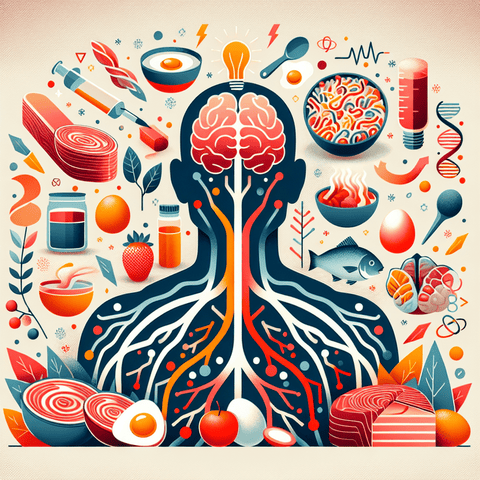Introduction
Vitamin B12 is a powerhouse nutrient essential for human survival and optimal body function. While most people associate cravings with pregnancy or emotional eating, nutritional deficiencies—particularly vitamin B12 deficiency—can also drive specific intense food cravings. Intriguingly, some of the longing for red meat, eggs, or dairy you experience may not be psychological, but your body signaling a nutrient imbalance. In this comprehensive post, we dive into how vitamin B12 impacts your health, the symptoms of its deficiency, why people crave certain foods as a result, and how restoring B12 levels can markedly improve your well-being. We'll also explore practical approaches to monitoring and supporting B12 intake through meals and supplements. Whether you're wondering why you're always tired, mentally foggy, or longing for a steak, this guide will connect the dots.
Understanding B12 Deficiency and Its Impact on Nutritional Health
Vitamin B12, also known as cobalamin, plays crucial roles in energy production, red blood cell formation, DNA synthesis, and neurological function. Because B12 is not produced by the body, it must be obtained through diet or supplementation. B12 is naturally found in animal-derived foods such as meat, eggs, fish, and dairy. For this reason, strict vegetarians and vegans are among those at risk for deficiency unless they consume fortified foods or supplements.
There are several causes of B12 deficiency. These include poor dietary intake, particularly in plant-based diets, but also issues with absorption. Disorders such as pernicious anemia, atrophic gastritis, Crohn’s disease, and even aging can reduce the stomach’s ability to absorb B12. Chronic use of certain medications, including proton pump inhibitors and metformin, may also interfere with absorption.
When B12 levels drop, it affects the body's ability to produce healthy red blood cells, which compromises oxygen delivery to tissues, leading to anemia-like symptoms. From fatigue to memory loss, the impacts worsen the longer they go unrecognized. Therefore, early detection and treatment—through dietary improvement or nutritional supplementation—are critical for avoiding long-term complications.
Nutrition-wise, a B12 deficiency can also trigger a cascade of other imbalances. For example, low B12 may impair cellular energy, disrupting magnesium and vitamin D metabolism. These changes can leave individuals more vulnerable to weakness, immune problems, and mood disorders. Monitoring B12 levels and maintaining adequacy is thus vital not just for one’s nervous system but for total nutritional equilibrium.
B12 Deficiency Symptoms: Recognizing Physical and Mental Signs
A deficiency in B12 manifests in both subtle and overt ways. Because vitamin B12 plays a fundamental role in numerous physiological processes, its absence can affect multiple systems. One of the earliest and most common symptoms is fatigue, which arises from impaired red blood cell production and consequent oxygen delivery deficits. People may feel constantly drained of energy, even after adequate sleep.
Pale or jaundiced skin may develop due to the breakdown of defective red blood cells, leading to increased bilirubin levels. Neurologically, B12 deficiency can manifest as numbness or tingling in the hands and feet, commonly starting in the extremities. This results from damage to the protective myelin sheath surrounding nerves. Left untreated, these issues can escalate to more serious coordination and balance disturbances.
Cognitive issues such as memory lapses, confusion, and decreased cognitive performance are also prominent signs. Additionally, psychological impacts such as irritability, mood swings, depression, and even apathy can occur. These symptoms are often mistaken for other issues such as thyroid dysfunction, anemia, or even early dementia in older adults, delaying proper diagnosis.
In adults aged 50 and up, the risks are higher due to decreased stomach acid production, which is required for B12 release from food. Early identification using blood tests and neurological evaluations can prevent progression. If cognitive or psychological symptoms begin appearing without a clear cause, B12 testing becomes a highly recommended diagnostic step.
In sum, the symptoms are multifaceted and may easily be confused with other conditions. This highlights the importance of considering B12 status when unexplained symptoms persist, particularly those involving fatigue, nerve health, and mental clarity.
B12 Deficiency Cravings: Why Do You Sometimes Crave Unusual Foods?
Have you ever suddenly craved a cheeseburger or multiple servings of eggs, especially when you normally avoid such foods? This may not simply be "comfort eating"—it could be your body sending signals that it's deficient in vitamin B12. Nutritional cravings are the body's intuitive way of informing us about what it lacks. Similar to how some people crave chocolate when magnesium is low, cravings linked to B12 often involve animal-based proteins high in the vitamin.
Craving red meat, cheese, liver, and eggs is particularly telling, as these foods are richest in B12. People who follow vegetarian or vegan diets—or have gone long periods without consuming these items—may notice such cravings increase. It’s the body trying to correct a biochemical need through behavioral nudges. In some cases, people have reported returning to omnivorous diets after intense cravings they couldn't ignore—only to discover later they were B12 deficient.
The mechanism behind these cravings is complex but largely physiological. Low B12 results in reduced production of neurotransmitters like serotonin and dopamine, altering mood and stimulating appetite behaviors. Psychologically, B12 deficiency-related fatigue may trigger cravings for calorie-dense animal foods perceived (correctly) as energizing.
These craving patterns serve as a warning sign and should not be ignored. They do not simply reflect preference but unmet biological necessity. Paying attention to sudden desires for nutrient-rich animal products—especially if they are out of character—can be the first clue in diagnosing a deficiency. Addressing the root issue via supplementation or high-B12 foods often relieves these cravings naturally.
If cravings persist or are accompanied by other symptoms, consulting a health professional becomes crucial. Supplementation with quality products, such as those from the Vitamin D & B-complex ranges, can bring vitamin levels back to balance and reduce abnormal food desires.
Low B12 and Hunger: Is Your Appetite Up or Down?
The link between B12 and appetite is intricate, often depending on the individual and the severity of their deficiency. Some people may experience an increased appetite, especially for certain foods such as red meat, fish, and cheese. This is because the body's energy demands are not being met due to inefficient red blood cell production and oxygen transport, often leading to a compensatory hunger response.
On the other hand, others may suffer from reduced appetite. Decreased energy levels, mood changes, or gastrointestinal discomfort such as bloating, nausea, or diarrhea associated with B12 deficiency may reduce the desire to eat. This reduction in appetite may further limit dietary B12 intake, exacerbating the cycle.
B12 is also involved in neurotransmitter regulation, particularly those controlling mood and satiety. A deficit in B12 may hinder the production of serotonin and dopamine, potentially increasing emotional eating or completely eliminating hunger pangs. Moreover, inefficient conversion of food into usable energy can cause the body to feel depleted even after eating, driving continued or erratic eating habits.
Managing appetite changes linked to B12 requires a targeted approach. Consuming B12-rich or fortified foods—like fish, meat, shellfish, dairy, fortified cereals—or implementing supplementation can help restore healthy hunger patterns. Individuals unsure about their status should consider blood testing followed by medical evaluation. Supplements, including sublingual or injectable formulations, are available for those with poor absorption or dietary limitations. Resources like omega-3 and vitamin D-rich supplements can complement B12 efforts by supporting overall energy metabolism.
Appetite, whether enhanced or diminished, should not be dismissed when evaluating energetic or mental changes. If you're finding yourself unusually hungry—or with no hunger at all—and experiencing fatigue or mood issues, B12 levels could be the underlying cause.
B12 Deficiency Signs: Detecting the Hidden Symptoms
Beyond the commonly discussed symptoms, B12 deficiency can produce some lesser-known yet telling signs that provide deeper insight into nutritional imbalances. These symptoms may include physical changes that are easy to overlook but highly telling when considered together.
For instance, glossitis (inflammation of the tongue) is one such phenomenon. It causes the tongue to appear smooth, red, and swollen, often accompanied by soreness and pain while eating or speaking. Other signs include mouth ulcers, a burning sensation in the tongue, and changes in taste perception.
Skin color may also shift. As mentioned earlier, a pale or slightly yellow (jaundiced) tone often reflects damaged red blood cells and inefficient oxygen transport. Brittle nails, hair thinning, or generalized skin dryness may also occur due to disruptions in cellular renewal processes tied to DNA synthesis, which heavily relies on B12.
Balance issues, clumsiness, and general unsteadiness stem from demyelination of neurons when B12 is deprived. These neurological effects can become irreversible if prolonged. In more advanced stages, people may begin shuffling when walking, experience a higher likelihood of falls, or even develop paresthesia—a pins-and-needles sensation.
Psychologically, apathy, a sense of detachment or disinterest in daily activities, and depression may deepen as neurotransmitter levels remain compromised. These shouldn't be shrugged off or assigned solely to stress or aging. Notably, such symptoms frequently coexist with more recognizable ones like fatigue, giving important diagnostic clues.
Anyone experiencing a combination of these symptoms should consult a healthcare provider and consider checking their serum B12 levels. When supplementation becomes necessary, choosing bioavailable options that support absorption and provide additional nutrients essential for nervous system health—such as magnesium or omega-3s—can provide synergy and strengthen recovery.
B12 Deficiency Linked to Appetite: Understanding the Connection
Appetite regulation in the human body is orchestrated by a complex web of biochemical signals, many of which rely on proper vitamin B12 function. B12 is intrinsically involved in maintaining neurological pathways that influence satisfaction, hunger signals, and energy production. When your B12 is low, appetite changes may occur not merely due to energy needs but because of hormonal and neurotransmitter imbalances.
Vitamin B12 helps in the synthesis of serotonin and dopamine—neurotransmitters that play critical roles in mood regulation and satiety. Disruptions to these systems may cause diminished joy from eating, or conversely, compulsive cravings for specific comfort foods rich in B12. Moreover, the body’s satiety system relies on efficient glucose metabolism and mitochondrial energy production, both of which are impaired when B12 is low.
Fatigue brought about by deficient red blood cells can be misinterpreted by the brain as hunger, particularly for high-protein or fatty foods. At the same time, a drop in physical activity resulting from low energy may further skew metabolic needs and mislead hunger cues. This can increase risks for secondary conditions like weight loss or gain, insulin resistance, or digestive issues.
People experiencing appetite disruptions should assess their total nutritional intake and discuss B12 status with a healthcare provider. Often, restoring B12 levels through nutrient-rich foods or supplements leads to more consistent and health-aligned eating patterns. Over time, the normalization of neurotransmitter activity stabilizes mood and resets bodily hunger indicators.
Recognizing appetite patterns as nutritional feedback rather than mere preference empowers individuals to take control of their health proactively. When changes in hunger persist without lifestyle or stress changes, checking vitamin B12 status may offer crucial clarity.
Nutritional Supplements: The Key to Restoring B12 Levels
For many individuals, especially those with absorption issues or dietary exclusions, supplements become essential in restoring and maintaining safe B12 levels. The most common supplementation routes include oral tablets, sublingual drops or sprays, and intramuscular injections. Each has unique advantages depending on the person's physiological needs.
For mild deficiencies or dietary gaps, oral and sublingual supplements are often effective and widely available. Sublingual forms may offer better absorption for some populations by bypassing the gastrointestinal tract. In cases of severe deficiency or pernicious anemia, injections administered by healthcare providers allow rapid replenishment of B12 stores in the liver and bloodstream.
Several categories of people may benefit from ongoing supplementation: older adults, vegetarians or vegans, those with gastrointestinal surgeries (e.g., gastric bypass), and anyone with digestive issues such as IBS or Crohn’s disease. B12 should ideally be taken as part of a B-complex or multinutrient strategy to support broader metabolic function.
Products from reputable sources, like Topvitamine's vitamin C and wellness support range, ensure purity, potency, and compliance with health regulations. Always look for supplements approved by governing health bodies and consult your physician before starting any regimen, especially if medications are involved.
When B12 levels rebound, many people report remarkable improvements in energy, mental clarity, and emotional balance. Cravings tend to reduce, appetite stabilizes, and overall productivity increases. Long-term, supplementation can be life-changing for those chronically underserved by nutritional gaps.
Practical Tips and Recommendations for Maintaining Healthy B12 Levels
Maintaining healthy B12 levels begins with awareness and continues through nutrition, testing, and lifestyle enhancements. The first step is incorporating foods naturally high in B12 into your daily intake. These include animal liver, beef, poultry, clams, tuna, salmon, milk, yogurt, and eggs. For vegetarians and vegans, fortified cereals, plant-based milks, and nutritional yeast are useful alternatives.
If regular testing shows borderline or low levels, supplementation under medical supervision is advised. When selecting a supplement, formulations with methylcobalamin (the bioactive form) may be preferable. High-quality options like those from Topvitamine’s vitality-support lineup can fill multiple gaps for optimal energy and nervous system support.
Additionally, make lifestyle adjustments that support nutrient absorption. Limit alcohol and acid-reducing drug intake, both of which impair B12 uptake. Manage stress, which can deplete B vitamins, and aim for balanced meals with healthy fats and proteins to assist absorption. Hydration, moderate physical activity, and consistent meal timing further support gastrointestinal health and vitamin uptake.
Monitor your symptoms regularly. If fatigue, mood swings, or neuropathy seem to recur or worsen, revisit your B12 status. Integrating functional nutrition into your health routines strengthens wellness resilience and enables you to catch changes early, avoiding irreversible complications.
Conclusion: Listening to Your Body's Cravings and Symptoms
Our bodies speak volumes if we learn how to listen. Vitamin B12 deficiency may initially manifest as vague symptoms—fatigue, cravings, mood changes—but left ignored, can progress to serious health consequences. Recognizing and respecting your cravings, hunger changes, and subtle physical cues can set the stage for recovery and strengthened nutrient sufficiency. Through a tailored approach involving nutrient-rich eating, supplementation, and lifestyle awareness, B12 levels can be brought back into balance, improving everything from mental acuity to cardiovascular function.
Managing your wellness involves more than treatment—it requires prevention. Keep track of emerging symptoms, prioritize whole-body nourishment, and don’t hesitate to seek guidance. After all, a well-fueled body creates the foundation for a thriving life. Addressing vitamin B12 needs not only mitigates cravings but sharpens vitality at the deepest biological levels.
Q&A Section
1. What foods should I eat if I crave meat or eggs and suspect B12 deficiency?
Focus on consuming B12-rich foods such as beef, poultry, liver, fish (e.g., salmon or tuna), dairy products, and eggs. For vegetarians, opt for fortified plant milks or nutritional yeast with added B12.
2. What are some unusual signs of B12 deficiency I might miss?
Examples include swollen tongue, mouth ulcers, numb limbs, shakiness or balance troubles, depression, and unexplained fatigue or forgetfulness. These signs often overlap with other conditions.
3. Can B12 supplements reduce food cravings?
Yes. When supplementation meets the body’s metabolic needs, the urge for high-B12 foods typically diminishes. Supplements help stabilize neurotransmitters and reduce compulsive eating behavior.
4. How long does it take for B12 supplements to work?
Improvements can be felt within days to weeks depending on severity. Neuropathy may take longer to reverse. Always monitor response under medical supervision.
5. Should I consider regular B12 testing?
Yes, especially if you’re over 50, vegan or vegetarian, taking medications that inhibit absorption, or experiencing chronic fatigue, mood issues, or nerve discomfort.
Important Keywords
- Vitamin B12 deficiency
- B12 food cravings
- Fatigue and low B12
- B12 appetite connection
- Nutritional supplements for B12
- Signs of low B12 levels
- Managing B12-related cravings
- Absorption issues and B12
- Foods high in vitamin B12
- Neurological symptoms of B12 deficiency



